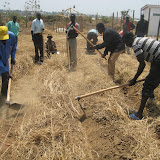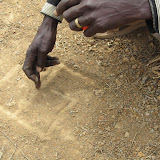On Monday, Oct 18 Edina Tumalu, one of the church leaders here, gave birth to twins!! Everyone is so thankful she is healthy and the babies are healthy!! She had some rough spots in her pregnancy; she recognizes God’s mercy and is thankful for the medical care she has received during her pregnancy and for the birth (in more common circumstances here she would have died). She is also thankful for the key support people from Holston have given her. Not everyone can access medical care. She has been going to the best obstetrician in town, Dr. Wole, who is an MD, has an ultrasound, and does surgery. The twins were just over 37 weeks gestational age, and though they are a bit small, they are fine and are now nursing well. The boy is 5 lb.7 oz. and is named Willfred Swanson (for God’s Will, Rev. Fred Dearing and Bishop Swanson); the girl is 4 lb 9 oz and is named Phyllis (for Phyllis Hankins) Desire. On her second day she was very lethargic due to some low blood sugar and an elevated temperature, but recovered the next day with some glucose and antibiotic and is now doing great (again, in the average situation in Sudan, the baby would have died). I feel blessed that I was able to be of some support and help during this past week. Edina called us Monday afternoon. She had some labor, and was admitted for a cesarean procedure , as the babies were not in good positions for vaginal birth. Boo, Phyllis and I went to the clinic right away, while Steve rallied prayer supporters by email and on Facebook. The clinic was waiting for the payment before starting, so Boo, through Holston Conference, was able to loan the money. We could peek through the curtain of the hallway which led to the operating room, and saw the babies as they were just born, and handed to the nurse to dry off! In Sudan, the family has to provide supplies and a lot of the care, so the babies were handed over to us and Edina's two aunts (see photo) to take care of (Edina’s husband was in Juba attending school). Edina came in the room soon. Her husband arrived this weekend; she should go home Monday. They keep mothers for 7 days in the hospital until their incision closes, as so many women return with infections if they are sent home earlier. I think this length of time will give Edina more rest and more chance to nurse the babies than if she were to go home. (She has a son 4 years old and daughter 7 years old, plus is taking care of 3 other orphans, and has a widow living with her who helps out.) She has several tukels (little one room houses) in a compound with a garden, next to her in-laws, and has needed the support that Holston has given her.
The clinic rooms are small and have two beds. Fortunately they have mosquito nets, as the windows have no screens. The beds are about two feet apart, and the door does not close. The conditions are not as desperate as at Yei public hospital, but they are not anything like the clean hospitals we have in the US. I was happy to be able to come back several days this week to support Edina in getting breast feeding started for Phyllis Desire, and be of general support. It has been quite some time since I had the chance to be of service, and I wasn’t sure how much support from me Edina would want. She told me in Sudan many women do not breastfeed until their milk comes in, which can take a few days. I’m glad she was interested in feeding anyway, so the babies can get enough food and gain the incredible immunity that the colostrum gives in those first crucial days. Also, they do not wash the baby with water for the first one or two months, but scrub them with cassava flour. Edina, however, was OK with using water! Phyllis Hankins was able to buy some clothes for the babies, as Edina only had cloths for baby blankets and no clothes. You can buy used Western clothes in the market, and that is the best place for baby clothes. The new clothes here are few and more dresses than little shirts.
Steve and I have both been working intensely to meet the November 1 deadline for applications for Advance Special Projects, which is how United Methodist Churches give designated money for specific projects. Once approved, churches may then donate to the project, and money is turned over as it is received. The application is similar to a four year grant application, but the approval of course does not guarantee a specific amount of funding. Actually it has been good to have this structure to project our workplans for the next four years. Steve wrote one for micro-finance (people can choose a village savings and loan program, or microenterprise start up help), and just finished a another for agriculture development. Now he and Boo are working on one to construct “permanent buildings” for churches (with concrete block walls and metal roofs). Buildings would double for the nursery/primary schools. All 17 of the Sudanese United Methodist congregations are asking for permanent buildings to replace the thatch roofed, wattle-and-daub structures that now serve as churches and schools.
I have been working on a church/village health project. The challenge I've been struggling with is to make sure the final impact of the project is saving lives. South Sudan health indicators are some of the most desperate in the world, caused by a combination of poverty, poor transportation, lack of functioning clinics and hospitals, lack of clean water (most of our churches now have wells giving access to safe water), lack of soap, lack of latrines, and poor sanitation and hygiene practices in the homes, lack of education and poor or wrong information about disease and prevention. So much can be done with health education and promoting disease prevention. For example, diarrhea kills especially children under 5, because of the poor sanitation and lack of latrines. Actually the resulting dehydration kills them, which could be remedied with homemade oral rehydration fluid and some basic knowledge. If everyone in the village has clean water, latrines and good handwashing, 80% of diarrheal disease can be prevented. Well meaning people have gone into villages and built latrines before. The villagers then feel like the latrines are owned by the builders, who should have the responsibility to clean them and keep them up. If the people do not understand their importance, they may tear them down to use the parts. If they don’t understand how disease is spread, they will not take all the many steps needed for general cleanliness. Though the solution seems simple, there needs to be a lot of health education, starting at the most basic level, and very thorough community involvement, training of committees, training of individuals to go house to house, and some time for change. I think there is lots of misinformation about the causes of various diseases, how the body functions and how to prevention disease. The horrible maternal/infant death rate (among the worst in the world) has a complicated solution too. The government of South Sudan has a good plan to establish rural health centers with birthing rooms. The problem with these, currently, is that there is not enough money for staff and medicines (part of their long term problem is there is no way to transport a mother for higher level care because of impassible roads, no ambulances and few vehicles). There is a 6 month training program for midwives, but trained women would rather find a job that pays rather than work at the public centers, where there is also no money for equipment for the birthing rooms. The midwives at the centers are supposed to train the Traditional Birth Attendants (TBA) in the villages, and give them supplies (which is unlikely). Most of the births occur in homes with or without a TBA. So I'm planning my work to complement this effort; I started with a simple plan to help distribute basic equipment and supplies to the midwives at the government health centers. That could save lives with a trained midwife. Steve encouraged me to keep working on a plan that could make that difference with TBAs as well, since they are on the "frontline" in the villages. Currently while there is a little training in south Sudan recently begun for midwives, there is no training program here now for TBA’s. By the end of the afternoon I had drafted a core curriculum and basic skills list with needed equipment. (It was exciting for me to get to use my midwifery knowledge again and love of teaching). With birth there can be an impact on improving infant and maternal health by making sure the mother has good nutrition, is healthy, and with some non-technical measures, but you have to have some knowledge of what to do. All these plans add up to more than can probably be accomplished in four years. We shall see! It eventually will take contracting with some trainers who are already here as well hiring a couple people part time to help me, which would be good also for preparing someone to continue the projects after we leave.
We are all very excited that AROSS, a local Christian group, including our churches/schools in their educational program. In our photos this week you can see the “megavoice players” being given to the pastors to use with their congregations and schools (see photos). These players have 40 lessons for teacher training, 4 lessons on sanitation and hygiene, and 3 which narrate the story of the Bible in English and Bari (local language.) They can be set up for small groups to listen to. All the churches have been asking for teacher training, and now they can some help in this area!! It is a great example of appropriate technology. Lessons can be added later on other topics as they are developed. There will be more coming out on health as well. The pastors were quite intrigued, excited and appreciative. Some of them are not familiar with any level of technology.
We have gotten some good feed back on the sanitation training I did a month ago. I passed out two additional handouts based on the training which were translated into the local language, with pictures so it can be used with those who can’t read the words. Several pastors said they have made “tippy taps” for handwashing.
The government of south Sudan is making plans for the referendum. We don’t have any reason right now to be worried about our safety, and we have a good network of well informed people here who keep us updated as needed. Steve wrote a sample advocacy letter to be used in the US. If you are interested, you can find the link at www.holston.org/about/communications/the-call/volEE/num31/sudan-advocacy-letter/.
A bit of personal news: the new house (Captain’s House) that Boo and Phyllis will live in is coming along. They should be ready to move in a few weeks. We have been gradually buying the things we will need for our household here at the UMCOR Guest House when they move out, including plates, silverware, bednets, and ordering furniture to be made (you can’t really buy ready made). I am thinking of Tennessee fall and seasonal foods. We can get some nice greens here (amaranth) and I cooked a local pumpkin, which is close to texture and flavor of acorn squash. We're blessed with access to a great variety of vegetables and fruit!
Saturday, October 23, 2010
Subscribe to:
Post Comments (Atom)
















No comments:
Post a Comment